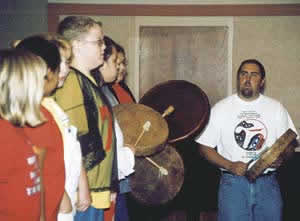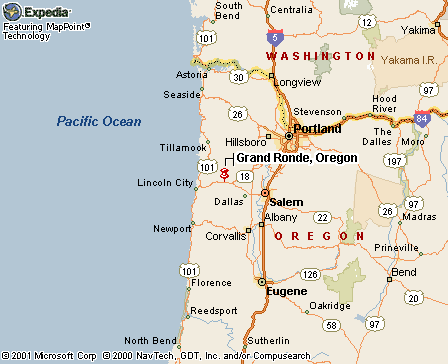|
|
Canku Ota |
|
|
(Many Paths) |
||
|
An Online Newsletter Celebrating Native America |
||
|
June 19, 2004 - Issue 115 |
||
|
|
||
|
Once-dying Chinook Language Finds Future in Voices of Children |
||
|
by Nancy Bartley |
||
|
credits: photo: Performers –—The Tribe’s Language Specialist Tony Johnson leads Tribal youth in a song. The children sang a favorite stick game song for the 70 or so teachers. |
|
Now, due largely to the 33-year-old Johnson, who regards each word of his ancestral tongue as an heirloom, the jargon also known as "Chinuk-wawa" has become a language of the future. In the seven years he has worked for the Confederated Tribes of the Grand Ronde to revitalize the language, Johnson, who grew up in Raymond on Willapa Bay, has developed a teaching program that has become a model for tribes around the region. He has been "vital to the language having any future," said Portland linguist Henry Zenk, with whom Johnson created a written Chinuk-wawa alphabet. What makes the program successful is the traditional master-and-apprentice approach, in which students learn from elders, then become teachers themselves. That's coupled with the more modern-day concept of language immersion, in which students speak Chinuk-wawa in and outside the classroom. When tribal spokesman Brent Merrill, 43, was growing up, Chinuk-wawa was a language elders would use with one another when they didn't want younger people to know what they were saying. Now the Grand Ronde program is so successful, he said, children here use Chinuk-wawa to keep secrets from adults. "When they don't want parents to hear about something, they switch over," he said. On a bookshelf in his office, Johnson displays a teaching certificate issued to him recently by the state of Oregon, making him the first licensed teacher of the uniquely expressive language, which was spoken two centuries ago by 100,000 tribal members, traders and explorers from Northern California to Southern Alaska. Three other licenses also have been issued - one to Zenk, the other two to tribal members here who learned Chinuk-wawa through adult-education classes taught by Johnson on the reservation. "It wasn't long ago - about 20 years - that the last of our elders who spoke it was passing away," said tribal teacher Bobby Mercier. "We are bringing a lot of our elders back by teaching the language. It's our identity." Johnson, the son of a tribal chairman, has found that preserving a language must be undertaken on many fronts. In addition to creating an alphabet, he has designed a computer program so the Chinuk-wawa characters can be typed. He teaches 4-year-olds at the tribal day-care center and has shared meals with the few remaining tribal elders who still remember the language, gleaning from them Chinook words like taqwfla, (hazelnuts), salt-tsfqw (salt water) and tilixaN (friend). And each of the past six years, he has organized a Chinuk-wawa workshop that draws linguists, historians and tribal members. Johnson wishes he could teach the language to the surviving Chinooks, but the tribe of 2,000, which once thrived near Chinook, Pacific County, has no money for such programs. The lucrative Spirit Mountain Casino, on the Grand Ronde Reservation, makes the language program affordable. Other tribes with casino money frequently inquire about the tribe's success, but the program is a commitment not just of money, but of time and tenacity, Johnson said. Still, he hopes other tribes will want to learn Chinuk-wawa, and that students he's teaching now will "grow up and marry each other and raise Chinuk-wawa-speaking households. Or become linguists and come back here and do what we're doing." Johnson was so determined that Chinuk-wawa would live on through his own son, Sammy, that he began talking to Sammy and singing him Chinuk-wawa lullabies even before the baby was born. To lose one's language is to lose one's culture, Johnson said. The Chinooks were once a strong tribe with related bands located near the mouth of the Columbia River, from Pacific County east to the Cascades. For thousands of years, they fished and traded with other tribes using two languages - one a jargon for trade, the other pure Chinookan. In the late 1700s, when ships began stopping in the harbors and trading with the Chinooks, English and French words were added to the trade language, which became known as Chinuk-wawa, or Chinook jargon. It was this language Lewis and Clark encountered when they arrived at the Columbia River in 1805 and were greeted by Chinooks offering boiled roots, dried sturgeon and potatoes. "What they were experiencing was clearly Chinuk-wawa," Johnson said. Though Lewis made notations of words in his journal, the field notes, believed to include an entire vocabulary, did not survive the trip back. Contact with whites exposed the Chinooks to deadly diseases, and by the mid-1800s the remaining Chinooks were sent to reservations. By the 1850s, when many tribes were gaining federal recognition, the Chinooks were overlooked. Many went to the Grand Ronde, where they were among at least 20 other bands with 20 different dialects. There, Chinuk-wawa became no longer just a trade language but one necessary for day-to-day communication among the diverse bands - the first language of those born on the reservation. "It was the language used when someone courted their mate, when someone went to the post office, when someone went to the sweat lodge," Johnson said. It took on the unique elements of the Grand Ronde culture, Johnson said, from how tribal members viewed nature, their spiritual life and their health. While the phrase "I have a backache" almost implies in English an ownership of the condition, in Chinuk-wawa the words mean "there is a sickness living in my back," implying "an animosity to illness," Johnson said. And the simple greeting, "How are you?" is more a question of the condition of your spirit than a casual inquiry. Johnson grew up with his parents and a brother in a two-story house in Raymond, off the reservation. As a young man, he sailed and fished in Willapa Bay and listened to his father tell stories of the past. But he had little of his culture except the few words in Chinuk-wawa he learned from his elders or could recall from his past. "Hum-upuch," his grandmother called him when he was a toddler. "Stinky pants." Johnson graduated with degrees in anthropology and silversmithing from Central Washington University in Ellensburg. Now divorced, he is raising 4-year-old Sammy in a small, gray rambler in Sheridan, a few miles east of the reservation. Since Sammy was a toddler, Johnson has taken him to the homes of the few tribal elders he knew who spoke the language. When Sammy utters the word "dret" - an expression similar to uh-huh - Johnson remembers the now-deceased woman they once visited. "It pleases me so much to hear the voice of our elders in our children." Each day, he and Sammy go to the reservation's Twah Sunchako preschool - Chinook jargon for "A Bright Day is Coming." In a classroom in the sprawling, gray education building, parents drop off their preschoolers for a half-day of language immersion. A no-English rule is observed by all - even the youngest preschoolers correct each other when someone lapses into English. The room was filled with signs identifying common classroom objects - clock, drum and fish in the aquarium - as tiktik, pumpum and phish. "When these kids get old, they'll be fluent speakers," said teacher Bobby Mercier, who was first exposed to Chinuk-wawa as a child. Now not only is he fluent, so is his 6-year-old son; his 2-year-old son also is learning the language. The reservation's other licensed Chinuk-wawa teacher is Jackie Whisler, whose dream was to carry on a conversation completely in Chinuk-wawa before her grandmother died. Now her own granddaughter and a niece are among the preschool students, and her daughter is in the adult-education class. Johnson and Sammy share the language in daily rituals of their own. Each morning when Sammy gets up, he talks about his dreams in Chinuk-wawa. And before he goes to bed, he tells his father the condition of his heart. "Nayka qat mayka, papa," he says. "Nayka qat mayka, Sammy," Johnson replies. Glossary
of Chinuk-wawa words and phrases:
Source: Tony Johnson |
||||||||||||||||||||||||||||||
|
|
www.expedia.com |
|
|
||
|
|
||
| Canku Ota is a free Newsletter celebrating Native America, its traditions and accomplishments . We do not provide subscriber or visitor names to anyone. Some articles presented in Canku Ota may contain copyright material. We have received appropriate permissions for republishing any articles. Material appearing here is distributed without profit or monetary gain to those who have expressed an interest. This is in accordance with Title 17 U.S.C. Section 107. | ||
|
Canku Ota is a copyright © 2000, 2001, 2002, 2003, 2004 of Vicki Barry and Paul Barry. |
||
 |
 |
|
|
The "Canku Ota - A Newsletter Celebrating Native America" web site and its design is the |
||
|
Copyright © 1999, 2000, 2001, 2002, 2003, 2004 of Paul C. Barry. |
||
|
All Rights Reserved. |
||
 GRANDE
RONDE RESERVATION, Ore. - (KRT) - To Tony Johnson, the Chinook
jargon widely spoken by his ancestors was not just a second-class
language used for trade but a language of tribal rituals, family
gatherings and courtship. Until recently, it was almost extinct.
GRANDE
RONDE RESERVATION, Ore. - (KRT) - To Tony Johnson, the Chinook
jargon widely spoken by his ancestors was not just a second-class
language used for trade but a language of tribal rituals, family
gatherings and courtship. Until recently, it was almost extinct.
